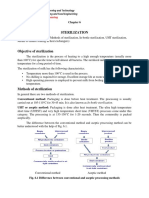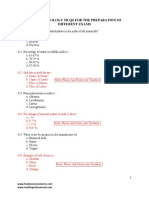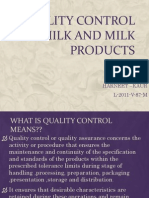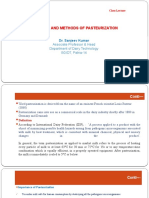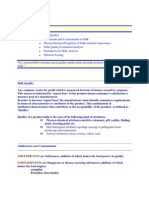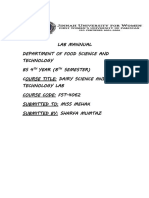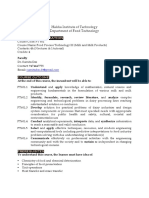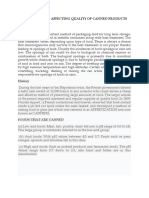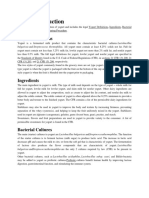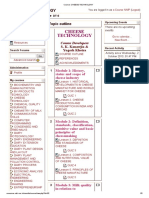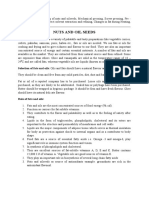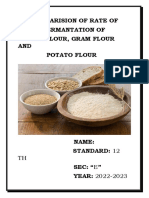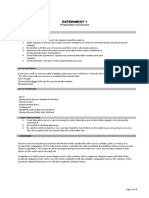Professional Documents
Culture Documents
Clot On Boiling Test
Clot On Boiling Test
Uploaded by
Hamza RehmanOriginal Description:
Original Title
Copyright
Available Formats
Share this document
Did you find this document useful?
Is this content inappropriate?
Report this DocumentCopyright:
Available Formats
Clot On Boiling Test
Clot On Boiling Test
Uploaded by
Hamza RehmanCopyright:
Available Formats
Clot on Boiling test (COB)
Clot on boiling test is used for quick testing whether milk remains stable and does not clot during
hot processing. As sedimentation leads to milk spoilage, it is necessary to understand the stability
against heat.
Introduction
The “clot on boiling test” (COB) is a test done with an inspection of the warmth stability of milk
through processing. As raw milk cannot be kept at standard room temperature or even at lower
temperature without preventing it from spoilage, pasteurization is needed. Hence, COB is
necessary to understand whether pasteurized will be stable for additional and further processing.
Objectives:
To determine the stability of milk for heat processing.
Relevant Information:
If milk is kept as such at room temperature, there will be increased in the acidity which is called
as developed acidity. If acidity is increased to more than 0.2 percent, there is coagulation due to
heat treatment, which is the result of dissociation of calcium caseinate salt. Hence it is essential
to know the heat stability of incoming raw milk for further processing.
Materials Required:
Test tube
Milk sample
Beaker
Burner/water bath
Procedures:
1. Take 5 ml of milk in the test tube.
2. Put this on boiling water bath for 5 minutes.
3. Remove the tube from water bath without shaking.
4. Note any acid smell or precipitated particles on the sides of the test tube.
Sample showing precipitated particles are recorded as positive C.O.B. test. Such milk is rejected
on the platform.
You might also like
- The Design of HACCP Plan For Butter PlantDocument17 pagesThe Design of HACCP Plan For Butter PlantJahangir AliNo ratings yet
- LPT 311 PDFDocument40 pagesLPT 311 PDFRiteshNo ratings yet
- Chapter 5 MilkDocument33 pagesChapter 5 Milkmaya adam100% (1)
- Milk PowderDocument28 pagesMilk PowderJinggazoomNo ratings yet
- Dairy-products-Technology - Practical Manual & TXT Book XIIDocument251 pagesDairy-products-Technology - Practical Manual & TXT Book XIIgabonilsenNo ratings yet
- Dairy Technology-Multiple Choice Questions: Chemistry TipsDocument7 pagesDairy Technology-Multiple Choice Questions: Chemistry TipsDhanya M AlexNo ratings yet
- Unit 6 Clean Milk Production: 6.0 ObjectivesDocument14 pagesUnit 6 Clean Milk Production: 6.0 ObjectivesRonak Rawat100% (1)
- Final Milk Lab ReportDocument15 pagesFinal Milk Lab Reportapi-272749175No ratings yet
- PresentationDocument39 pagesPresentationabimubNo ratings yet
- Fat Rich Dairy Products Technology 1Document243 pagesFat Rich Dairy Products Technology 1sakshiNo ratings yet
- Sterilisation of Milk Dairy and Food EngineeringDocument11 pagesSterilisation of Milk Dairy and Food EngineeringFandi KurniawanNo ratings yet
- FST MCQS 4 With Answers Key Updated PDFDocument32 pagesFST MCQS 4 With Answers Key Updated PDFSreelekshmi LechuNo ratings yet
- Chapter 3 Condensed and Evaporated MilkDocument48 pagesChapter 3 Condensed and Evaporated MilkAlamgir Hasan100% (1)
- Sensory Evaluation of Concentrated Milk Products FinalDocument41 pagesSensory Evaluation of Concentrated Milk Products Finalhauvu75% (4)
- Quality Control of Milk and Milk ProductsDocument11 pagesQuality Control of Milk and Milk ProductsDrHarneet Taneja Kalra80% (10)
- Processing of Buttermilk NotesDocument3 pagesProcessing of Buttermilk NotesArjun VasudevNo ratings yet
- Condensed MilkDocument5 pagesCondensed Milkkarthivisu2009100% (1)
- Processing of MilkDocument3 pagesProcessing of MilkHarshit100% (1)
- Principles Methods of PasteurizationDocument11 pagesPrinciples Methods of PasteurizationK.SHANTHI100% (1)
- Milk AnalysisDocument9 pagesMilk AnalysisLaxmana Naik0% (1)
- Starter Cultures in Food ProductionFrom EverandStarter Cultures in Food ProductionBarbara SperanzaNo ratings yet
- Dairy Lab Mannual CompleteDocument40 pagesDairy Lab Mannual CompleteZarakhankhan KhanNo ratings yet
- 1-DAIRY PRODUCTS (Lecture 6)Document31 pages1-DAIRY PRODUCTS (Lecture 6)inshirahizhamNo ratings yet
- Course FT601Document4 pagesCourse FT601fawwazNo ratings yet
- Properties of Milk: Course: Dairy and Food EngineeringDocument13 pagesProperties of Milk: Course: Dairy and Food Engineeringgurupreet singh100% (1)
- A. China B. France: C. IrelandDocument12 pagesA. China B. France: C. IrelandK41 DH15TPNo ratings yet
- 5.milk LipidsDocument5 pages5.milk LipidsAbhijith S. PNo ratings yet
- 250+ TOP MCQs On Dairy Products - 1 and AnswersDocument8 pages250+ TOP MCQs On Dairy Products - 1 and AnswersShivani100% (1)
- Time: 1 Hr. 30 Min. Total Marks: 60: Important InformationDocument9 pagesTime: 1 Hr. 30 Min. Total Marks: 60: Important Informationrishab KumarNo ratings yet
- 48997019fff FNB Cheese AssignmentDocument27 pages48997019fff FNB Cheese AssignmentNicoleta Mihaela BuzaNo ratings yet
- 250+ TOP MCQs On Milk Quality Farm - 1 and AnswersDocument8 pages250+ TOP MCQs On Milk Quality Farm - 1 and AnswersFARHABNo ratings yet
- 2.milk Processing - NDDocument13 pages2.milk Processing - NDAbhithNo ratings yet
- Factors Affecting Quality of Canned ProductsDocument5 pagesFactors Affecting Quality of Canned ProductsRohit SainiNo ratings yet
- Methylene Blue Reduction Test (MBRT)Document18 pagesMethylene Blue Reduction Test (MBRT)SHAIKH100% (2)
- Yogurt ProductionDocument2 pagesYogurt ProductionFifi Lifia0% (1)
- Course - CHEESE TECHNOLOGYDocument5 pagesCourse - CHEESE TECHNOLOGYAmit Kr GodaraNo ratings yet
- FDA Recommended Pasteurization TimeDocument2 pagesFDA Recommended Pasteurization TimeMarquel Audreyan0% (1)
- Minimally Processed ProductsDocument3 pagesMinimally Processed ProductsOliver TalipNo ratings yet
- IntroductionDocument4 pagesIntroductionsumit_kumar3No ratings yet
- IntroductionDocument4 pagesIntroductionCeyah Nurr0% (1)
- UNIT - IV 1. Processing of Fats and OilsDocument12 pagesUNIT - IV 1. Processing of Fats and OilsHumera AdsNo ratings yet
- Milk ManualsDocument18 pagesMilk ManualsLAKSHYA VERMA0% (1)
- CEREALS PPT 72Document72 pagesCEREALS PPT 72Raifa FathimaNo ratings yet
- BrineDocument15 pagesBrinekasun12374590% (1)
- Comparision of Rate OfferDocument10 pagesComparision of Rate Offerl gnaneshuNo ratings yet
- Definition, Composition and Standards of Khoa, Rabri and BasundiDocument17 pagesDefinition, Composition and Standards of Khoa, Rabri and BasundiRonak RawatNo ratings yet
- Rn.4 Cream Neutralization & Ripening.Document14 pagesRn.4 Cream Neutralization & Ripening.Utkarsh Deshmukh100% (1)
- New Technologies in Paneer MakingDocument6 pagesNew Technologies in Paneer MakingAnur SinglaNo ratings yet
- Moisture and Total Solids AnalysisDocument44 pagesMoisture and Total Solids AnalysisNicholas BoampongNo ratings yet
- Butter ManufactureDocument14 pagesButter ManufactureKSHETRIMAYUM MONIKA DEVINo ratings yet
- Pasteurization of MilkDocument16 pagesPasteurization of MilkFaizan TariqNo ratings yet
- Leaflet - Milk FermentationDocument3 pagesLeaflet - Milk FermentationNoor SultanNo ratings yet
- Ineligible Halal Certification Category For MalaysiaDocument11 pagesIneligible Halal Certification Category For Malaysiaazurah3No ratings yet
- Butter NotesDocument22 pagesButter NotesMani Jatana100% (1)
- Dairy Engineering Questions and Answers KeysDocument14 pagesDairy Engineering Questions and Answers KeysAshutosh MasihNo ratings yet
- Practical Manual: Food Adulteration Prof J.N. SenguptaDocument10 pagesPractical Manual: Food Adulteration Prof J.N. SenguptajnsenguptaNo ratings yet
- Aeration of Cereal Dough by YeastDocument13 pagesAeration of Cereal Dough by Yeastkolita kamal100% (1)
- Hurdle TechnologyDocument21 pagesHurdle TechnologyPallaviNo ratings yet
- Experiment No 1 Preparation of CheeseDocument5 pagesExperiment No 1 Preparation of CheeseArmiee InfiniteNo ratings yet
- Condensed Milk Production: Paul MatimbaDocument32 pagesCondensed Milk Production: Paul Matimbamatthew matawoNo ratings yet










